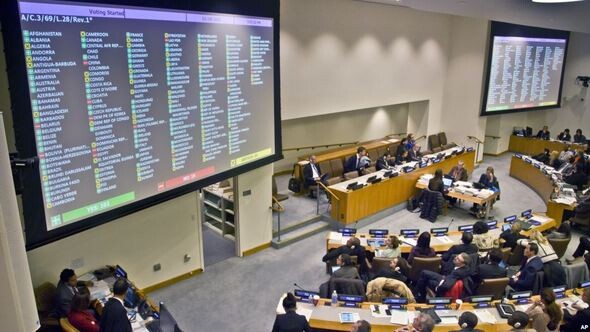hankyoreh
Links to other country sites 다른 나라 사이트 링크
UN passes resolution condemning North Korean human rights violations

On Nov. 14, the UN passed a new North Korean human rights resolution denouncing the North’s human rights violations and calling for improvement. This was the 13th such UN resolution. During a meeting at the UN Headquarters in New York, the UN Third Committee, which often deals with human rights issues, adopted a new North Korean human rights resolution that had been jointly drafted by the EU and Japan and jointly sponsored by more than 60 countries without taking a vote.
This was the 13th year in a row, since 2005, that a North Korean human rights resolution passed the UN Third Committee, and it was the fourth time, after 2012, 2013 and 2016, that the resolution was passed by consensus, without requiring a vote. This is different from a unanimous vote, since individual countries can abstain from consensus. The resolution will be taken up next month by a full session of the UN General Assembly.
The resolution asserts that more than half of North Korean citizens face a shortage of food and medical services and denounced North Korea for applying its resources to the development of nuclear weapons and ballistic missiles instead of the welfare of its people. It also drew attention to “the long-standing and ongoing systematic, widespread and gross violations of human rights in the Democratic People's Republic of Korea." The resolution expressed grave concerns that North Korea was guilty of torture, summary executions, arbitrary detention and abduction of foreigners around its borders.
The resolution voiced concerns about the fact that the reunions of families divided by the Korean War have been suspended since Oct. 2015 and expressed hope that the necessary measures would be taken, including confirming whether separated family members are alive or dead, allowing relatives to exchange letters and visit their homes, and holding regular reunions on a large scale. In addition, the resolution called on North Korea to verify whether or not foreigners detained in the country are still alive and to provide them with consular interviews, according to the Vienna Convention on Diplomatic Relations. Reportedly, six South Koreans and three Korean-Americans are currently detained in the North.
The resolution also states that the UN Security Council should take appropriate measures against the person most responsible for North Korea’s crimes against humanity, such as imposing sanctions or referring the case to the International Criminal Court (ICC).
Before the resolution was adopted, North Korean Ambassador to the UN Ja Song-nam declared that North Korea “categorically” rejected the resolution, saying that it was not even necessary to ask for a vote. Before leaving the meeting, Ja said that the resolution was "a product of the political and military confrontation” and a politicized attempt to overturn the North Korean regime. Countries including China, Russia, Iran, Venezuela and Cuba declined to join the consensus for the adoption of the resolution.
“Just as last year, the government welcomes the adoption by consensus of the North Korean human rights resolution by the Third Committee for the 72nd session of the UN General Assembly, with 61 countries, including South Korea, taking part as joint sponsors,” South Korea’s Foreign Ministry said in a statement by its spokesperson released on the morning of Nov. 15. “The government draws attention to the fact that the UN General Assembly has emphasized protecting the human rights of detainees and the families divided by the Korean War in this year’s resolution by expressing its concerns about the suspension of divided family reunions and by calling on North Korea to protect detainees’ basic rights, such as consular interviews, to confirm whether or not they are alive and to permit contact with their families.”
By Kim Ji-eun, staff reporter
Please direct questions or comments to [english@hani.co.kr]

Editorial・opinion
![[Column] Has Korea, too, crossed the Rubicon on China? [Column] Has Korea, too, crossed the Rubicon on China?](https://flexible.img.hani.co.kr/flexible/normal/500/300/imgdb/original/2024/0419/9317135153409185.jpg) [Column] Has Korea, too, crossed the Rubicon on China?
[Column] Has Korea, too, crossed the Rubicon on China?![[Correspondent’s column] In Japan’s alliance with US, echoes of its past alliances with UK [Correspondent’s column] In Japan’s alliance with US, echoes of its past alliances with UK](https://flexible.img.hani.co.kr/flexible/normal/500/300/imgdb/original/2024/0419/2317135166563519.jpg) [Correspondent’s column] In Japan’s alliance with US, echoes of its past alliances with UK
[Correspondent’s column] In Japan’s alliance with US, echoes of its past alliances with UK- [Editorial] Does Yoon think the Korean public is wrong?
- [Editorial] As it bolsters its alliance with US, Japan must be accountable for past
- [Guest essay] Amending the Constitution is Yoon’s key to leaving office in public’s good graces
- [Editorial] 10 years on, lessons of Sewol tragedy must never be forgotten
- [Column] A death blow to Korea’s prosecutor politics
- [Correspondent’s column] The US and the end of Japanese pacifism
- [Guest essay] How Korea turned its trainee doctors into monsters
- [Guest essay] As someone who helped forge Seoul-Moscow ties, their status today troubles me
Most viewed articles
- 1[Column] The clock is ticking for Korea’s first lady
- 2After 2 months of delayed, denied medical care, Koreans worry worst may be yet to come
- 3Hong Se-hwa, voice for tolerance whose memoir of exile touched a chord, dies at 76
- 4[Column] Has Korea, too, crossed the Rubicon on China?
- 5[Correspondent’s column] In Japan’s alliance with US, echoes of its past alliances with UK
- 6Samsung barricades office as unionized workers strike for better conditions
- 7All eyes on Xiaomi after it pulls off EV that Apple couldn’t
- 8[Editorial] As it bolsters its alliance with US, Japan must be accountable for past
- 9[News analysis] After elections, prosecutorial reform will likely make legislative agenda
- 10US overtakes China as Korea’s top export market, prompting trade sanction jitters